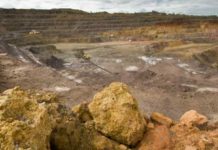
[miningmx.com] — MINES Minister Susan Shubangu has played down the negative appraisal of the Fraser Institute study on South Africa’s mining dispensation, saying the bulk of proposed mitigations were already in the process of being implemented.
Speaking at the Prospectors and Developers Association of Canada convention in Toronto on Monday, Shabangu said: “The report does not say anything new that we have not been saying already.
“We are aware of these challenges and today I am here to give you an update of what we are doing, not only to increase rankings but to our value proposition as an attractive investment destination,’ she said.
The authoritative Fraser Institute report, released last week, showed the country slipped to a ranking of 67 out of 79 mining destinations in terms of the survey’s policy potential index, which assessed mining executives’ views on the attractiveness of the mining policies being implemented by the governments of various destinations.
Pointing to the ongoing overhaul of the Mineral Resources and Petroleum Development Act (MPRDA), Shabangu said the act was sound and relevant, although it contained ambiguous provisions which have created room for multiple interpretations.
She said an overhaul of the entire mining regulatory system was being lead by the Mining Growth, Development and Employment Task Team (Migdett), which highlighted some critical areas which required attention:
• Clarifying the consultation process precedent to the submission and processing of mineral rights.
• Streamlining of the licensing process which would be mitigated by the launch of the online cadastre system at the end of March.
• Strengthening provisions which sanctioned non-compliance.
• Strengthening provisions to improve working conditions.
“We have also published the amended mining charter in September last year, with improved clarity on requirements as well as the scorecard.’
The mineral rights audit found that the DMR’s systems were not up to scratch, said Shabangu.
“Sometimes this was misinterpreted as corruption. It was time for a cleanup and I am encouraged and saddened by the results,’ she said.
“I am encouraged because it helps us going forward to factor in the lessons from the study, while at the same time I am saddened by the fact that the level of non-compliance is still very high.’
INFRASTRUCTURE
Trying to address concerns over inadequate and aging infrastructure, Shabangu said Transnet had allocated R40bn towards revamping rail capacity.
“All these infrastructure programmes have factored current and future mining requirements proposed in the mining sector strategy.’
Shabangu also defended the launch of the state-owned African Exploration Mining Finance Corporation (AEMFC), saying it would operate on equal grounds with the private sector while also fulfilling national developmental priorities.
“The state-owned company will fight it out like anyone else – like PetroSA has done in the cut-throat petroleum sector. Already AEMFC has been refused several applications during this time.’
Pointing to the government’s recent emphasis on beneficiation, Shabangu said this was a “natural progression from a resource-based economy to a secondary and tertiary economy.
“This will present enormous investment opportunities in the country for both South African and foreign investors,’ she said.
“IMMINENT CRISES’
According to the notes of an address to be made later on Tuesday by mining law expert Peter Leon from Webber Wentzel, the potential for future crises in South Africa’s mining industry was not limited to a flawed licensing system and issues of maladministration.
“A possibly more serious source of uncertainty is the exigent pressure for substantial socioeconomic transformation in South Africa and the government’s apparent failures to address the issue properly,’ read the presentation.
Leon said the promotion of black economic empowerment (BEE) in the mining sector has ironically became a catalyst for the populist support for the nationalisation of the country’s mines.
“This is because it has promoted a form of “narrow’ BEE, resulting in the enrichment of the well connected few, rather than a broader class of previously disenfranchised black South Africans.’
He said the Kumba/ICT and Lonmin sagas have caused considerable “collateral damage’ to South Africa’s reputation as a safe investment destination.
“At the same time, the minister’s recent announcement of a new electronic mining title system, the ongoing audits of rights by the DMR and the prospect of significant amendments to the MPRDA this year may presage a better future for the mining industry.’











